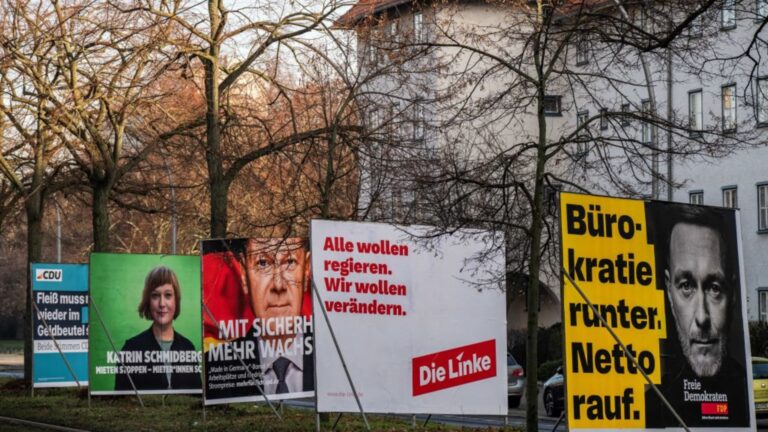Election campaign posters for (from R) the Free Democrats (FDP), the Left Party (Die Linke), The Social Democratic Part (SPD), the Green Party (Die Gruenen), and the Christian Democratic Party (CDU) line a boulevard in Berlin on January 20, 2025.
John Macdougall | Afp | Getty Images
BERLIN — Centrist parties struggled in Germany’s election on Sunday, with former Chancellor Olaf Scholz’s Social Democratic Party (SPD) recording its worst-ever result as many voters shifted to the extreme right and left.
Speaking in Berlin soon after exit polls were released on Sunday night, Scholz said it was a “bitter” defeat.
His SPD party got just 16.4% of the vote, according to preliminary figures, while the Christian Democratic Union (CDU) and its affiliate, the Christian Social Union (CSU), secured the largest share of the vote, with 28.5%. Although this means the conservative alliance won the election, it was still their second-worst result ever and below the closely watched 30% mark.

Parties that have traditionally made up the political fringes recorded significant gains, however, as voters flocked to the extremes. As widely expected, the far-right Alternative fuer Deutschland (AfD) doubled its vote share from the last election to just over 20% on Sunday, making it the second biggest force in Germany’s parliament.
This strength will “serve as a reminder to centrist parties to swiftly address the country’s multiple challenges – or face potentially even greater electoral upheaval at the next election,” Carsten Nickel, managing director at Teneo, said in a note on Sunday night.

The far-left Die Linke party benefitted from an unexpected show of support, defying expectations to achieve 8.8% of the vote, up from 4.9% in the 2021 election. Just a few weeks ago it was unclear whether the party would even cross the 5% hurdle needed to enter Germany’s parliament.
“The extreme — extreme right, extreme left — clearly came to close to 30% and this has made the entire German political landscape more fragmented,” Carsten Brzeski, global head of macro at ING, told CNBC on Monday in Berlin.
This could herald a “new normal” for Germany, he added.
Migration debate boost
The success of the fringe parties can largely be attributed to the hotly contested topic of migration, according to Holger Schmieding, chief economist at Berenberg.
“The polarizing debate about migration has benefitted the political extremes,” he told CNBC. “Most importantly, it has energized the minority of Germans who want open borders for uninvited migrants and refugees. These voters have flocked to Die Linke, the only party fully in favor of that,” Schmieding said in emailed comments.
Germany has been engulfed in a fiery debate about migration throughout the election campaign as several parties used violent attacks in Germany committed by people due to be deported or with a foreign background to push for tighter immigration laws.
CDU-CSU chief and likely chancellor-to-be Friedrich Merz earlier this year got into hot water for pushing a non-binding motion on migration policy, that he had spearheaded, through parliament with support of the AfD. This marked the first time in Germany’s postwar history that a majority was achieved with the help of the far right.
Two other factors at play are demographics and geographics, according to ING’s Brzeski.
“Die Linke and AfD did extremely well on social media and did very explicit campaigning on social media, which worked well,” he said, suggesting that the parties reached a younger audience there — a strategy that has long been key to the AfD.
Data shows that the two parties are especially popular with younger voters, with Die Linke becoming the most popular party among 18 to 24-year-olds, gaining around one-quarter of their vote, followed by the AfD in second place. Die Linke was also the biggest party in a mock election of under-18s.
Geographically, Brzeski pointed to the widespread success of the AfD in East Germany, where the party secured the vast majority of direct mandates. The far-right party has long been capitalizing on economic insecurity and anti-establishment sentiment in the region, experts told CNBC earlier this month.
Outlook for political extremes
Looking ahead, observers now see a risk of the extreme parties continuing to gain strength unless changes are made by the incoming centrist government.
Germany’s mainstream “needs to get its act together and tackle key issues,” such as migration and the state of the country’s economy, Schmieding warned, saying political extremes could continue to grow in popularity.
If this happens, by the next federal election there’s no guarantee the parties would be excluded from government, he said. Despite the AfD being the second biggest party in Germany, all mainstream groups have so far said they would not enter a coalition with them.
Brzeski also urged caution over the ability of a centrist government, which will likely be made up of a CDU-CSU and SPD coalition, to keep the more extreme parties at bay. Historically these parties governing together — referred to as the “grand coalition” — has actually strengthened extreme parties, he explained.
“This puts the next coalition really to an even stronger test. So if they mess up, it’s going to be the AfD, really, winning the next elections,” Brzeski said.


